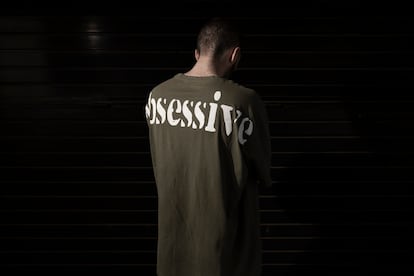Young couples with sex lives broken by porn
Accessible pornography crept into their imagination when they were minors and destroyed their creativity. The explosion of instant gratification from these images and the disconnection from their partner has caused a mental block in young adults’ sexual relationships


Marc has a hard time talking about the impact porn has had on his life. The 26-year-old confesses that it’s difficult: “I can’t get an erection with girls in real life. My relationship with my girlfriend of two years ended because of that. We approached each other, we took off our clothes, we could touch each other and everything during foreplay and it got us both very aroused. But, when the moment came, my ability just disappeared.”
Every day he wonders if there is a culprit. His parents did not protect him from the internet nor did they ever talk to him about sex, and in high school he remembers some very basic conversations. As a teenager, his friends talked more and more about the subject and he felt more pressure to know what to say. At the age of 13 he started watching porn, and without realizing it he entered a downward spiral.
At first he was excited to watch any type of video, usually on Pornhub or Telegram, where he would do keyword searches (like the name of a porn actress) and he subscribed to channels and groups. All those images made him feel insecure and he did not have his first sexual encounter until he was 23. “I had high expectations, but suddenly I saw that I was the protagonist, I got overwhelmed, and my brain did not respond,” he says.
In countries like Spain there is no official data on how porn consumption affects sexual relations in young couples, but some of the sexologists and researchers who see patients in clinics have been noticing new patterns for years. Young couples are no longer indulging in petting — getting pleasure through stroking, rubbing, or kissing… with or without clothes — in their first sexual encounters, and instead they go directly to penetration. They no longer kiss as much as before, and it is common for them to start the encounters with fellatio (the girls report that it is mainly they who try to please their partners), and the pace is frenetic. Their partners want to reach orgasm quickly regardless of their partner’s pleasure.

“At an early age, porn is harmful to constructing one’s sexuality and it has a tsunami effect at a social level... You end up with a very specific vision of sex and what the interaction with the other person is like,” says gynecologist Raquel Tulleuda, who is also an expert in clinical sexuality and head of the sexuality care unit at the Mútua de Terrassa University Hospital (Spain). The average age of initiation into watching porn in Spain is 12 years old, although in 20% of cases it occurs when the minor is only eight years old. These were the findings of the largest study of its kind published in Spain, carried out by researchers from the University of the Balearic Islands in 2018.
How do these images impact the subsequent encoding of pleasure? Tulleuda explains that our brain does not have a basic mechanism to distinguish between fantasy and reality, and what it does is it compares with previous experiences. It searches its archives to catalog an emotion. “What happens when we are children is that the file folders are empty, so there is nothing to compare, and when an emotion is very shocking it becomes an experience. Children then have a genital response, and if that experience is pleasant, what they do is repeat it. After a time the folder is filled with what they see in porn and that transforms their desire.”
Other experts, such as the psychologist and sexologist Alejandro Villena, talk about mirror neurons, those that are connected to imitation. The greater the consumption, the more they are altered. “The mark it leaves in adolescence is greater, since the earlier the consumption of porn begins, the less capacity there is to digest it. It is a product that burns the stages of emotional-sexual development. Pornography destroys creativity,” says Villena, who also heads an organization that offers resources and help to people with porn addiction.
At age 24, Marc went to therapy for the first time. Everything related to screen time and masturbation worked, but his problem in real experiences kept repeating over and over again. “My sexologist explained to me that my mind had become so accustomed to being aroused by porn that even my body had become accustomed to climaxing in a certain position, lying on my side or on my back... By changing the conditions and standing up, or getting into other positions, I wouldn’t get an erection,” he says. He wanted to make sure that he did not have any physiological problem and went to the urologist. “It’s all mental,” they confirmed.
A study carried out with more than 3,400 men between 18 and 35 years old published in 2021 by JMIR Public Health and Surveillance tried to measure the relationship between men’s sexual response and porn consumption. The results showed that about 20% of the participants suffered from erectile dysfunction and that, the greater the viewing frequency, the greater the development of this dysfunction.
“The sexual response (auditory, visual, tactile, postural, sexual, and dopaminergic) associated with the conditions generated by porn consumption has been repeated so many times that they have been internalized as something that is commonplace in their sex life, and they generate automatic responses,” according to Villena. “They [the consumer] have become so accustomed to it that if you change the conditions and place them in a real sexual relationship, they have difficulty in acting naturally and fully,” he adds.
Clinically, it’s called performance anxiety: the man feels like he is undergoing an exam and added to that is the disconnection that occurs with respect to others. “Once you start watching porn, you end up preferring it, since it is easier, faster, and simpler,” says Villena, who believes that for years the ravages of porn on sexuality have been very silenced and that now there has been an explosion in cases.
I ask my partner to do what I have seen
According to one of the largest surveys carried out on almost 4,000 adolescents aged 13 to 18 from the Balearic Islands, Spain, on the access and impact of porn, 39.6% of the boys recognized that it negatively affects relationships with partners, a percentage that dropped to 7% in the case of girls. 26% of the boys said that “they ask their partner to do what they have seen” in those videos (compared to 19% of girls); and 50% of girls said they “watch porn to find out what their partner likes,” compared to 15% of the boys. The time when they watched porn was at night, and the most common place was in their own home, mostly in private, on the internet and through mobile phones.
Luis Ballester, a social researcher at the University of the Balearic Islands and co-author of the study, points out that there are well-documented effects of the impact of porn on minors, such as the impoverishment of sexuality, meaning that the role of seduction and sensoriality not focused on oral, vaginal, or anal penetrations is reduced. There is an increase in aggression and sexual violence with partners or strangers, and there is reduced empathy. “It changes our perceptions of the body, attitudes, and behavior itself,” he says.
This decrease in empathy is one of the effects that gynecologist and president of the Spanish Federation of Sexology Societies Francisca Molero sees the most in the clinic. “The majority profile is that of a man over 25 years old who finds it difficult to get excited with his partner. He is not interested in paying attention to her enjoyment and masturbation with porn is more rewarding because he reaches orgasm faster. Shared sex requires effort and [porn] has made him lazy.” It is what Alejandro Villena calls the sex of the me-me and the yeah-yeah. It is a more selfish and narcissistic sex, although it is not done consciously. “A lot of the time reciprocal pleasure is no longer the issue,” he points out.
In other research, Ballester’s team found that 69% of adolescents go to the internet to answer their questions about sex and that 90% of male university students believe that porn is faithful to real sexuality. Regarding the type of porn, 76.25% of the sample responded that they mainly watch hardcore porn (which shows genitals, explicit sexual acts, and physical and verbal violence) or extreme porn (showing violence physical and verbal, aberrations, and dominance-submission).
“Porn sneaks into the lives of minors through mimetic learning of sexual practices, even at ages when the existence of drives is unknown,” says Ballester, who emphasizes that less than 15% of the parents surveyed believe that their children consume pornography — when 90% of adolescents between 13 and 18 years old claim to have consumed it at some point. 68.8% of youths of that age claim to have received some type of emotional and sexual education at school, lasting between one and four hours.
Reprogramming the brain
Is it possible for a man like Marc to recode his way of perceiving sex? Sexologist Raquel Tulleuda explains that the first thing is for both he and his partner to be aware that it is a pathological construct and, from there, teach them to create new dynamics. “The first thing is to break with this video consumption. It is not a job that can be done in a couple of weeks, and the partner’s involvement is very important because they either become a co-therapist or they boycott the treatment.” One of the points is to work on the “mediocrity” of the sexual relationship and assume that there will not be fireworks every time, but that most of the time it will be like eating at an inexpensive restaurant. “Your toes are not going to curl with every encounter. There is a very clear conditioning with everything they have seen,” says the doctor.
Carlota, who prefers not to give her real name, is 21 years old and is still uneasy about penises. When she was 11, she discovered sexual videos of her parents on her father’s cell phone, and shortly afterwards, she saw that he was sharing sexual photos with other married couples through sexual chats without her mother knowing.
“The first time I discovered sex was from there, and as a teenager, when I began to have my first experiences with boys, I felt dirty. I had no emotions or feelings, I didn’t move a lot, and I never seemed active in any way, since I never had sexual desire. I would lie face down and do nothing else, I would let them penetrate me.” For years, everything that involved feeling pleasure disgusted her. “My partners didn’t know how to ask what was wrong with me and why I was not enjoying myself, that has created distance between us.”
Her therapist, who also does not give her name to protect Carlota, explains that the girl who came to her consultation was devastated. The impact of those images at such a young age had stolen her innocence and she was incapable of perceiving sex as something pleasurable. “She denied herself the possibility of enjoying herself. Instead, she focused on giving her partners pleasure and then she was overtaken by very unpleasant feelings. We are working on getting her to know her body and trying to codify her way of relating on a sexual level in a different way.”
In a study with more than 300 university students (average age 26) it was seen that 30% claimed that they imitated pornographic material to put it into practice in their real sexual life, and 24% reported that comparing themselves to what they saw in porn made them disappointed if they did not obtain the same results in real life. Only 5% said they got more pleasure from intimate encounters thanks to porn.
Carlota's letter (21 years old) for parents with minor dependent children
Hi. My name is Carlota, and I am here to tell my story.
When I was 11 years old I found sexual videos of my parents and, shortly after, I found out that my father shared photos and lingerie with many other couples he met through sexual chat rooms. That was the first time I discovered sex, and from then on, I had a totally unpleasant view of it. I will never forgive my father's immaturity, inability, and cowardice for not speaking to me from a grown-up perspective when I confronted him about it. I told him and my family what I had discovered. At 17 I had the strength to talk to my father, my therapist told me that I had to do it in order to move forward in my process, and I didn't hesitate. Listening to him was a turning point and improvement in my sexual process.
From where I am now, a normal 21-year-old woman sitting on my couch eating a pizza, I would like to ask all those parents who have small children to take responsibility for their phone, and for what they let their children see. I ask for emotional responsibility, and that they be protected.
The images that I saw that summer led me be angry for many years, and that led me to smoke weed, to enter into bad relationships, and form bad habits. Now that I'm in therapy, I'm getting to know my own body, since I felt complete rejection. Some friends even asked me if I was asexual, but I knew it was something in me that was keeping me from getting carried away in the act.
I always believed that I would never be cured, or that I would never be able to have a sexual relationship with someone. I thought that I wouldn't get over it, and that no one understood me. I experienced a huge block when it came to that kind of situation. I cried a lot and I suffered alone.
I would also like to ask all women and mothers to invite their daughters to discover themselves in a way that is healthy and natural, and to teach them that consensual sex between two people is good, and above all, it is based on desire, and it should not be something we do just to please others.
Lots of love,
Carlota
Sign up for our weekly newsletter to get more English-language news coverage from EL PAÍS USA Edition
Tu suscripción se está usando en otro dispositivo
¿Quieres añadir otro usuario a tu suscripción?
Si continúas leyendo en este dispositivo, no se podrá leer en el otro.
FlechaTu suscripción se está usando en otro dispositivo y solo puedes acceder a EL PAÍS desde un dispositivo a la vez.
Si quieres compartir tu cuenta, cambia tu suscripción a la modalidad Premium, así podrás añadir otro usuario. Cada uno accederá con su propia cuenta de email, lo que os permitirá personalizar vuestra experiencia en EL PAÍS.
¿Tienes una suscripción de empresa? Accede aquí para contratar más cuentas.
En el caso de no saber quién está usando tu cuenta, te recomendamos cambiar tu contraseña aquí.
Si decides continuar compartiendo tu cuenta, este mensaje se mostrará en tu dispositivo y en el de la otra persona que está usando tu cuenta de forma indefinida, afectando a tu experiencia de lectura. Puedes consultar aquí los términos y condiciones de la suscripción digital.








































